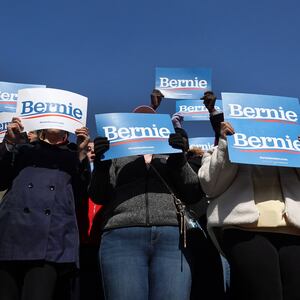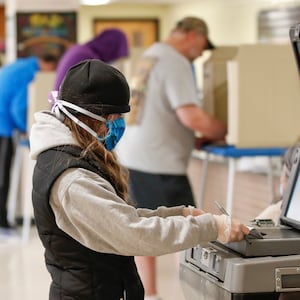In mid-March, former Vice President Joe Biden released a massive plan to combat the coronavirus pandemic and prepare the nation for future threats to public health and safety. The document outlined a wartime-style mobilization of the entire federal government to increase access to testing, deploy medical supplies to affected areas, and bolster American workers and businesses hit by the pandemic’s ongoing economic nightmare.
But much of the plan—reopening the Affordable Care Act insurance exchanges, increasing funding for medical supplies and health infrastructure, creating a U.S. Public Health Service Reserve Corps—is predicated on Biden’s election in November, an outcome that is far from guaranteed if American voters are forced to choose between civic duty and physical health.
Missing in the 7,100-word plan is any proposal to protect the operation and integrity of elections and voting in an era when much of the nation remains on official lockdown. Of nearly a dozen statements made regarding the coronavirus pandemic, none have directly addressed growing calls from many of Biden’s fellow Democrats to universalize access to mail-in voting across the country.
Public health experts told The Daily Beast that a massive expansion of mail-in voting access, as well as increasing the number of days that in-person voters could cast ballots, may be the most pressing—and most actionable—coronavirus-related issue facing Biden as the nominee and as the de facto leader of the Democratic Party.
“It’s just utterly irresponsible to have normal in-person voting,” said Professor Larry Gostin, director of the O’Neill Institute for National and Global Health Law at Georgetown Law Center.
“Anything that reduces the amount of time that people have to spend together particularly indoors and in close contact would be valuable in preventing COVID-19 transmission,” said Dr. Timothy Brewer, a professor of epidemiology at UCLA’s Fielding School of Public Health and of Medicine.
As the broader understanding of the outbreak in the United States has grown, as well as appreciation of how contagious the novel coronavirus is, the consensus of most elected officials, government agencies and public health authorities in regards to the safety of various activities—from physical distance to wearing masks—has changed relatively rapidly.
Biden’s stance on the question of how to safely and securely conduct elections during the coronavirus pandemic is no exception. Ahead of Tuesday’s still-undecided Wisconsin primary, where a shortage in poll workers and the delayed delivery of thousands of mail-in ballots led to hours-long lines and dangerous levels of crowding outside polling places, Biden expressed continued support for in-person voting during the crisis.
“A convention, having tens of thousands of people in one arena, is very different than having people walk into a polling booth with accurate spacing with 6-10 feet apart, one at a time going in, and having the machines scrubbed down,” Biden said last Thursday. “I think you could hold the election as well, dealing with mail-in ballots and same day registration. I mean, there’s a lot of things that can be done—that’s for the Wisconsin courts and folks to decide.”
The day before the election, Biden appeared to soften that stance in an interview on the Today Show, saying that while he’d “much prefer to have on, you know, in-person voting,” that would depend “on the state of play” going forward.
Local officials in Wisconsin, meanwhile, told The Daily Beast ahead of the election that they feared in-person voting could get people killed.
“My major fear is that people are going to get sick and possibly even die from voting tomorrow,” said Kim Butler, the head of the Polk County Democratic Party. Those fears were not unfounded. Multiple poll workers in Florida tested positive for the coronavirus after that state’s March primary, and in-person voting during municipal elections in France is believed to have caused hundreds of new infections.
Only on Tuesday evening—35 minutes after polls had closed in the state—did Biden tell CNN’s Chris Cuomo that he actually opposed in-person voting in the state’s primary.
“We shouldn’t have had the election in the first place, the in-person election. It should have been all mailed ballots in, it should have been moved,” Biden said.
Sen. Bernie Sanders, Biden’s former opponent in the race who dropped out in part due to concerns that his continued candidacy could “interfere” with the fight against the virus, had called for the election to be postponed weeks ago.
“The conservative majority on the Supreme Court in Wisconsin are willing to risk the health and safety of many thousands of Wisconsin voters tomorrow for their own political gain,” Sanders said, after Wisconsin’s highest court ruled that the state’s Democratic governor had exceeded his authority in attempting to push back in-person voting to June. “Holding this election amid the coronavirus outbreak is dangerous, disregards the guidance of public health experts and may very well prove deadly.”
Public health authorities have said that crowded in-person voting conditions, which almost definitionally involves breaking social-isolation guidelines about close congregation of strangers in enclosed spaces, is a needless risk, particularly when mail-in voting has become commonplace in states across the country.
“This is a once-in-a-century event, so we don’t have a lot of good models for it,” said Gostin. “But it seems to me it’s feasible: it’s not high technology, it’s relatively secure, and it doesn’t disenfranchise everybody—everybody has the same equal opportunity to vote.”
Some advocates for expanded access to voting have expressed concern that changing to an entirely mail-in election could disenfranchise voters who have irregular or limited access to the postal service. In Arizona, for example, only a quarter of Native Americans have a traditional street address. For many older African-American voters, showing up in-person at a polling place on Election Day is a tradition going back to the civil rights era, and they are wary of placing their trust in a novel system.
In places where vote-by-mail might not be feasible or preferable, Brewer suggested conducting elections on what might be called the “grocery store model,” creating special hours at polling places for older voters or voters at higher risk of complications from COVID-19 infection, and extending the number of days where in-person ballots could be cast to reduce crowding.
“We have in-person grocery shopping, right?” Brewer said. “So, designing in a way where people can go to one of multiple locations—as was already done in the California primary—so they don’t necessarily have to go to their particular polling place, they could go anywhere, over a wide range of time and multiple days, and even allowing people to book appointments I think would also be valuable.”
For the Biden campaign, Tuesday’s turmoil in Wisconsin brought the issue into sharp focus.
“What happened in Wisconsin cannot happen again—during this primary season or in November,” said campaign spokesperson Bill Russo. “What Wisconsin voters were forced to endure because of the chaos around their election cannot happen again.”
Russo said that the campaign—and the country—can protect both the right to vote and public health in the general election, if the issue is addressed urgently.
“We have to make sure that we secure for all Americans the right to vote, including options for safe, accessible in-person voting and expanded vote-by-mail and early voting,” Russo said. “It is imperative that we protect our democracy and every American’s right to vote and we know that is going to be complicated while we are also simultaneously taking the critical steps we need to take to protect our health and get this virus under control.”
Republicans, meanwhile, are largely opposed to expanding mail-in ballot access or accounting for the coronavirus pandemic in expanding voting locations. In a White House press briefing on Tuesday, President Donald Trump expressed open hostility to mail-in voting—despite having voted by mail last month in Florida’s Republican primary, presumably for himself—alleging potential for mass voter fraud.
“Mail ballots, they cheat,” Trump said, beginning an extended tangent about thoroughly disproven allegations of voter fraud in California in the 2016 election. “Mail ballots are very dangerous for this country because of cheaters. They go collect them. They are fraudulent in many cases. They have to vote. They should have voter ID, by the way.”
In late March, Trump made clear in an appearance on Fox & Friends that his opposition was for political reasons, telling the hosts that national vote-by-mail would mean “you’d never have a Republican elected in this country again.”
Fellow Republicans have largely followed Trump’s lead in opposing expanding mail-in ballots in the name of public health. In a call with reporters on Thursday morning, House Minority Leader Kevin McCarthy repeatedly called House Speaker Nancy Pelosi’s desire to fold such expansion into future pandemic relief legislation “disgusting.”
“That’s disgusting to me right now,” McCarthy said. “Stop worrying about politics. Start worrying about what’s in front of us right now, and that’s the health of the nation, combating this virus, and our economy.”
Gostin said that opposition to mail-in voting during the coronavirus pandemic can be sorted into two views: charitable and uncharitable.
“I think the charitable view is that there’s concern about the integrity and the security of the election,” Gostin said, although he added that careful planning of a postal ballot could sort out the vast majority of those concerns. “The less charitable view is that there’s a knowledge that it would dampen the voter turnout, and when you dampen voter turnout, you can politically favor one party over another.”
Voters, however, are already expressing growing hesitation about voting at a polling place in November. A Pew Research Center survey released on April 3 that 63 percent of registered voters said that they would feel uncomfortable voting in person. In the seven days since that poll was published, the nationwide death toll has more than doubled.
“I don’t think there’s any question that voters will be discouraged from getting an absentee ballot, much less showing up in person and voting,” U.S. District Judge William Conley said at a hearing about potentially delaying the Wisconsin primary last week. “But for a statewide election to be suspended by a federal judge would require some real evidence that the election itself has been wholly undermined.”
“And I don’t think you're going to have that until Election Day.”







